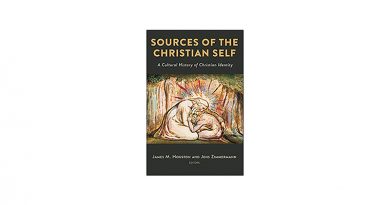Jack
By Marilynne Robinson
McClelland & Stewart, 2020, 309 pages
Reviewed bY Maxine Hancock
Jack is Marilynne Robinson’s fifth novel, and the fourth in which characters introduced in Gilead are more fully developed. If you have already entered the world of Robinson’s mythical town of Gilead, with its follow-up novels, Home and Lila, you will not be surprised to find yourself again reading about a character who first came into our reading lives alongside the Rev. John Ames. If this novel is your introduction to the series, you will be intrigued and challenged as you move ever deeper into the story of Jack, the beloved prodigal son of Ames’ dear friend and fellow-minister, the Rev. John Boughton.
In Gilead, a visiting Jack Boughton disturbs the peace of John Ames’ garden – and causes the old pastor to discover that the real “snake in the garden” lies in his own heart in the form of the sin of jealousy. In Home, Jack is the prodigal son who comes home to the welcome of his family, but does not stay. In the final pages of that novel, there is a cameo appearance of his wife and son.
In this novel, the story of Jack Boughton’s marriage is explored as a complex romance unfolds. We find Jack to be a self-confessed and alcoholic “ne’er-do-well” white man loved by–and in love with–a thoughtful, intelligent black woman high school teacher who holds a position of esteem within her separatist black community. Both are children of clergymen: Jack is the son of the Presbyterian minister in Gilead. Della Miles is the daughter of a bishop of the African Methodist Episcopalian church.
They meet in St. Louis, Missouri, where most of the story is set, but each comes from a different state–not only of the Union, but also of race relations. Jack is from Iowa, in 1851 the earliest of the states to abolish anti-miscegenation laws prohibiting marriage between white and black people. Della, on the other hand, is from Tennessee, where such laws continued to be on the books until 1978. The story, set in the late 1940s, shows love achingly reaching across the social chasm of discrimination and separatism.
The point-of-view of the novel is almost entirely Jack’s. His name becomes increasingly important as the story progresses: at first, he is just any “jack” – a general nomenclature for a nobody. He is merely the shadowy and shifty prodigal of the earlier novels. Gradually, as the story progresses, the reader discovers Jack as a real person: intelligent, morally sensitive and lost. He attempts to counter “his old compulsion to do damage as chance offered” by living in a way that is entirely harmless, only gradually realizing that to be human is to possess the power of hurting others, and that one cannot live in relationship without that being a corresponding possibility.
Robinson takes sin very seriously. In this book, she demonstrates, both through Jack and through the social situation of the novel, that the nature of sin is not tied up merely in individual acts – Jack acknowledges that he is a thief and a liar – but in the deepest sub-strata of human nature. Jack is less aware of the underlying sin of pride that keeps him bound in hopeless attempts at self-reformation. Sin, according to Robinson, is bound into our lives at both the individual and societal levels. The only solvent that can take away the stain of intrinsic sinfulness is costly, self-sacrificing love. In this novel and others of Robinson’s series, God’s love and grace are poured out at great cost through faithful people.
After a brief prelude, the novel begins with a long night’s dialogue in a city cemetery, a fitting opening to a book concerned with the human situation poised between mortality and eternal destiny. Robinson here throws down the gauntlet to her reader: suspend disbelief, she says. Accept that this situation could, however unlikely, be possible. Engage in the dialogue between these two young people, poised as it is between despair and hope, and place your bets.
The action of the novel actually serves as a long and thoughtful exposition of George Herbert’s poem, Love (III), which begins, “Love bade me welcome, but my soul drew back, / Guilty of dust and sin. / But quick-eyed Love … / Drew nearer to me. . .”. You may find yourself, as I did, reading and rereading the poem as a sort of map to the story as it unfolds.
With Della being a high school English teacher and Jack a highly literate reader, Robinson sets scenes in such evocative places as graveyards, libraries and bookshops, enriching the story with the generous use of allusions and references to literature from Shakespeare’s Hamlet to William Carlos Williams’ Paterson. The entire narrative is told against a background of biblical story: Jack is depicted as a fallen Adam, in a graveyard-garden, hiding from God and from love. We watch his tremulous and tentative engagement with life, knowing this will have uncertain and certainly complicated outcomes.
Jack and Della are bound into both a personal and social situation which makes the conclusion as thought-provoking as everything else in the novel. For under the themes of sin and grace as experienced by individuals in the novel, there is an ongoing probing of the structural and social and cultural sin of racism, which Robinson demonstrates is deeply bound into the situation in which the lovers find themselves.
Marilynne Robinson is a demanding writer: her writing is elegant in its precision and depth. And she demands much of her readers as she entangles them in a web of relationships located in a specific social context. While arguing for the nature of sin and the generosity of grace, she also demonstrates that the meaning of individual life is known only as it is bound up in relationship with others. If you are looking for a diversion, Jack may not be the right novel for you. But if you seek an engrossing story that engages you intellectually, morally and theologically as few modern novels even attempt to do – this may be the best book you read in this second year of COVID.
And as you close the book, you may find yourself reading or re-reading the earlier three Gilead novels, and hoping, along with me, that Robinson’s next novel will be titled, Della. TAP
Maxine Hancock is a lifelong reader and writer. She is also Emeritus Professor of Interdisciplinary Studies & Spiritual Theology at Regent College, Vancouver BC.




